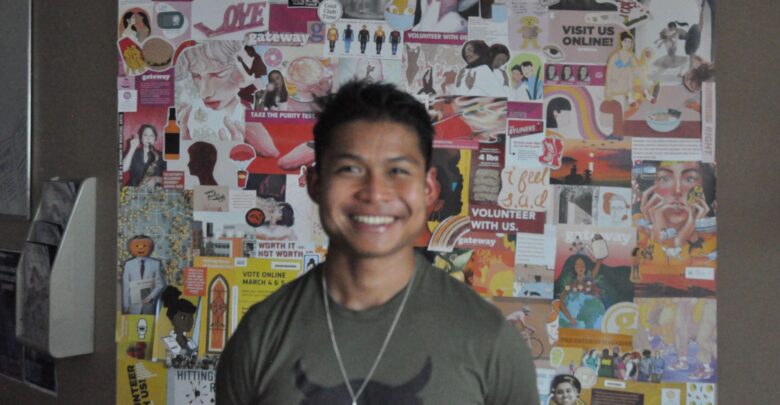‘The Long Term Podcast’: Trying to spark open conversations and authenticity
The Long Term Podcast is run by University of Alberta student Adven Villa, and looks to promote connectivity and positivity.
 Liam Hodder
Liam HodderAdven Villa is a fourth-year University of Alberta student who created, and hosts The Long Term Podcast. The podcast has students from the U of A and MacEwan University on to chat about their struggles, hopes, and inspirations. The Long Term Podcast was started a year and a half ago and now has over 140 episodes.
Overall, “the goal with it is to help people find meaning,” Villa said. “As a U of A student myself, I always wanted to hear what it was like for other students.” The podcast has many students who talk about their experiences in school, and getting through it.
“My goal is to make [the podcast] relatable, and for people to join me on the journey to find myself, because I’m still pretty lost, I still don’t know myself. But by having these thoughtful conversations, I help them figure it out, and I also learn,” Villa explained.
Vulnerability is often a large part of these conversations, and part of the relatability of the podcast is its willingness to be emotionally transparent, Villa said.
“Every single person, no matter where they are in life, has some sort of struggle. Whether it’s insecurity about their appearance or the way they talk, or the way they come off, there’s always that element. It seems that vulnerability brings us together.”
Villa said that for him, vulnerability can be a struggle, but that pushing for open conversation allows for the podcast to be authentic and “highlight that human element.”
“I think we’re missing that authentic [human] element,” Villa says
He explained that for a lot of his guests there’s a sense of relief after their conversations. And he feels that there isn’t enough meaningful discourse between people in everyday life.
While the goal of these conversations is for human connectivity, some episodes present as more informative content. Villa said that he does not fact-check his guests.
“A lot of people talk about very serious stuff. And they could be wrong sometimes and I could be talking to them and learning the wrong thing, and I’m willing to admit that. But I think it’s really all about conversation. A lot of people complain that [interviewees] aren’t credible, but I think everybody’s got a voice. And they may not be informed, but there’s always room for change and to grow.”
He said that in the future, as the podcast grows, he’ll possibly “hone in on fact-checking.” But for now, he is mainly looking to chat with people he’s interested in what they’re passionate about.
Villa said that, “if you really want to be informed, there’s ChatGPT, Google, and books written about all this stuff.” The podcast is more so to combat a “lack of authenticity” in current media.
“If you look on YouTube and Instagram, it won’t take you long to find [artificial intelligence (AI)] generated viral videos, [and] I think we’re missing that authentic [human] element. I think as time progresses, AI is going to take over and there’s going to be less real [content] on the internet.”
“I’m trying to spread positivity and connect people … if it’s not for you, I’m not forcing you to watch the content,” Villa says
Since many of his guests are speaking in a podcast setting for the first time, Villa has a process to make them comfortable.
“Prior to guests coming on, we discuss how I’m going to introduce them, which topics we are going to choose, and some of the questions.” Villa said that most guests question their credibility to speak on certain topics. He helps them feel comfortable voicing their thoughts, and that he also has instances of self-doubt.
While the podcast is planned and prepared, Villa has begun to experiment with on-the-fly street interviews with the public. Recently, he asked “what is the meaning of life?” to people out on Whyte Avenue. Whyte Avenue is a local bar-street, and with that, comes possibly intoxicated interviewees. Villa said he makes sure to double check with people the next day before he posts any interviews with anyone who could have been drunk during the interview, giving them the chance to ask for their part to not be included.
Villa is planning to begin doing interviews on the U of A campus. Doing these public interviews allows for a lot more public commentary, and hate. There already exist some other street-interview content creators like Kempes Pandey “Kempes on Campus” and Smartanxiety. These two receive a large amount of hate for their antics. Villa is expecting the same when he makes his way to campus interviews.
On handling the hate, Villa said he maintains his positivity. “I’m trying to spread positivity and connect people. If it’s not for you, I’m not forcing you to watch the content,” he said. He extended this to Pandey as well. “He’s out there trying to make people laugh, doing his silly dances, and he’s doing interviews as well. He’s just trying something new. Something we can’t forget is there’s much more positivity [than hate].”
Villa says he wants to keep going with the podcast, developing it as it grows. And this coming year, he can be expected to be seen around campus interviewing students.




